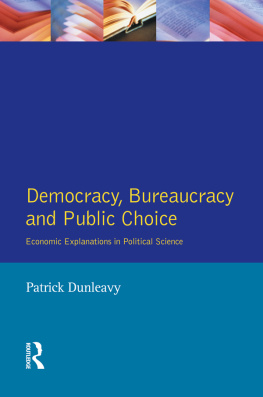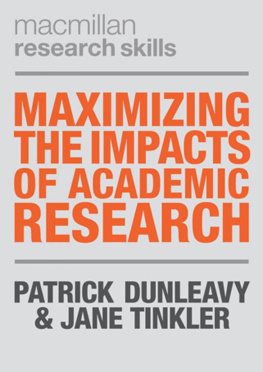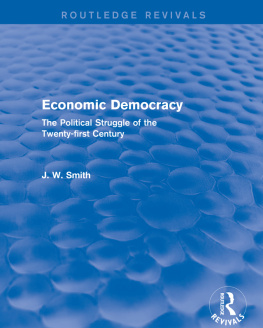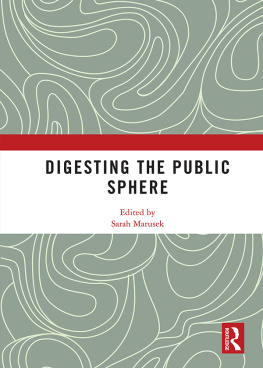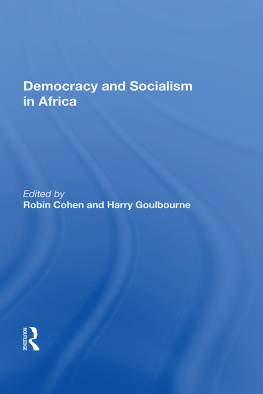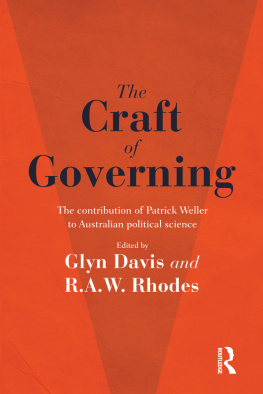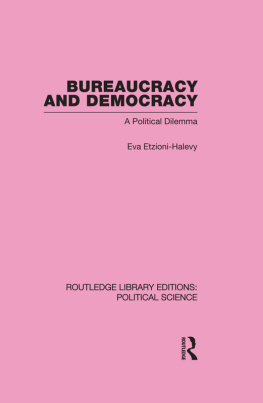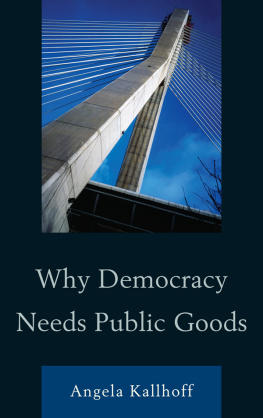DEMOCRACY, BUREAUCRACY AND PUBLIC CHOICE
First published 1991 by Prentice Hall
Published 2013 by Routledge
2 Park Square, Milton Park, Abingdon, Oxon OX14 4RN
711 Third Avenue, New York, NY 10017, USA
Routledge is an imprint of the Taylor & Francis Group, an informa business
Patrick Dunleavy, 1991
All rights reserved. No part of this book may be reprinted or reproduced or utilised in any form or by any electronic, mechanical, or other means, now known or hereafter invented, including photocopying and recording, or in any information storage or retrieval system, without permission in writing from the publishers.
Notices
Knowledge and best practice in this field are constantly changing. As new research and experience broaden our understanding, changes in research methods, professional practices, or medical treatment may become necessary.
Practitioners and researchers must always rely on their own experience and knowledge in evaluating and using any information, methods, compounds, or experiments described herein. In using such information or methods they should be mindful of their own safety and the safety of others, including parties for whom they have a professional responsibility.
To the fullest extent of the law, neither the Publisher nor the authors, contributors, or editors, assume any liability for any injury and/or damage to persons or property as a matter of products liability, negligence or otherwise, or from any use or operation of any methods, products, instructions, or ideas contained in the material herein.
ISBN 13: 978-0-7450-0233-0 (pbk)
British Library Cataloguing in Publication Data
Dunleavy, Patrick. 1952-
Democracy, bureaucracy and public choice: economic explanations in political science.
1. Politics. Collective choice
I. Title
320.019
ISBN 0-7450-0167-X
ISBN 0-7450-0233-1 pbk
Typeset in 10/12 Plantin
by Keyset Composition, Colchester
______
CONTENTS
______
with Hugh Ward
with Hugh Ward
______
______
When I first began working on some of the ideas in this book, my attitudes towards public choice theory were wholly critical. My idea was to develop an ad hominem critique of some key rational choice models, to show that they were internally inconsistent and ideologically slanted, and to do what I could to demonstrate that this was only a speciously attractive research programme. My own work in public choice was to be merely a ladder used to reach this limited goal, later to be kicked down when it was no longer needed. Instead, ten years later, much of my research has been restructured around a particular kind of institutional public choice method. I now recognize the value of instrumental models as a mode of thinking clearly about the manifold complexities of political life, and could not pursue research without using them. Yet my scepticism about the scientific status of much liberal political economy remains, especially about its close links with the new right in practical politics.
The way in which public choice has developed as an alternative political science carries twin dangers. On the one hand, practitioners in the field often display a thrust towards premature formalization. Major theoretical works emerge, and spawn an increasing technical literature in which some of the key works' starting assumptions are progressively lost to view. Questions about inherently messy empirical applications are pushed aside by the pace of the development of formal models, and existing empirical knowledge is often pointlessly impugned or ignored in the process. On the other hand, political scientists using alternative approaches in fields colonized by public choice often react defensively, sidelining public choice contributions, and making only very generalized or basic criticisms of the methods employed or the results obtained. The resulting dialogue of the deaf is unsatisfactory because it means that rigorous scrutiny of public choice is thin on the ground, while the empirical applicability of reconstructed public choice models is rarely appreciated. The purpose of this book is to contribute towards the development of a more fruitful and critical interaction.
The first part of the book to be written was a joint paper with Hugh Ward published in 1981: its basic ideas are now incorporated into . I owe a great debt to Hugh which I am proud to acknowledge here: without his input I would never have had the confidence to launch upon this venture or to sustain it through several bad patches. Closely rivalling Hugh's influence in these pages is that of Bob Goodin, who both as a friend and an editor constantly identified arguments needing attention and suggested avenues for further thought.
My colleagues at the London School of Economics and Political Science, Brendan O'Leary, Brian Barry and Desmond King, very generously undertook to read and comment on the whole draft of the text, and Christopher Hood read all of . Their detailed and helpful reactions triggered a major rewrite which delayed the book a further six months, indicating only too well the extent to which I am in their debt.
My third acknowledgement is to the M.Sc. and doctoral students who attended my public policy seminars at the London School of Economics throughout the 1980s. They put up with numerous early variants of my ideas and patiently explained to me why they would not do. Their reactions, interests and seminar demands stimulated virtually all of the better ideas contained here, and at the same time broadened my education in comparative politics.
I am grateful also to all the many professional colleagues who criticized earlier versions of these ideas at PSA (Political Studies Association) Conferences and as journal editors and referees, especially Christopher Pollit, Rod Rhodes, George Jones, Anthony King, Ivor Crewe and Wyn Grant. Edward Elgar helped me to define the initial idea for the book, while Clare Grist of Harvester Wheatsheaf provided the external drive needed to get it finished long after it was initially promised. Gordon Tullock and two other anonymous American reviewers stimulated many changes late on in the preparation of the text for which I am very grateful.
Finally, I thank Sheila Dunleavy for help and encouragement too vast to be quantified. In a period when it is fashionable to make fun of the structuralist maxim that authors do not write books, I, at least, am acutely aware that anything worthwhile in these pages is a collective achievement.
Patrick Dunleavy
London School of Economics
and Political Science
______
______
I thank the editors and publishers of two journals for permission to reuse passages from my papers which they originally published.
1. The British Journal of Political Science published by Cambridge University Press for:
(a) Bureaucrats, budgets and the growth of the state: reconstructing an instrumental model, British Journal of Political Science (1985), vol. 15, no. 3, pp. 299328.
(b) Group identities and individual influence: reconstructing the theory of interest groups, British Journal ofPolitical Science (1988), vol. 18, no. 1, pp.2149.
2. Public Administration published by Basil Blackwell for:
(a) Explaining the privatization boom: public choice versus radical approaches,

